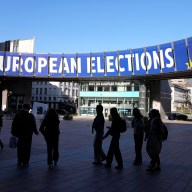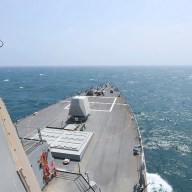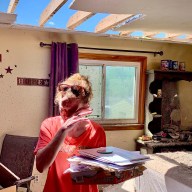TEHRAN, Iran – The opposition is planning a dramatic show of strength on one of Iran’s most important and resonant political stages: the main Islamic prayers Friday in the capital.
Their top supporter in the clerical leadership – Ayatollah Akbar Hashemi Rafsanjani – is delivering the sermon this week for the first time since the disputed June 12 presidential election, and pro-reform activists intend to pack the hall to prove their movement remains vibrant despite the government’s harsh crackdown.
Opposition leader Mir Hossein Mousavi said late Wednesday he will attend the prayers, also for the first time since the upheaval over the elections erupted.
But hard-liners are also likely to attend, raising the prospect of a highly public confrontation during the prayers, which are broadcast live on national radio. Government supporters the past week have been pressuring Rafsanjani to make clear his loyalty to Supreme Leader Ayatollah Ali Khamenei in his sermon.
In a sharply worded letter made public this week, hard-line university students demanded Rafsanjani “break his silence by defending the values of the revolution and clearing up the speculation surrounding him.”
The opposition hopes the prayers will be a key moment to prove its staying power. Mousavi claims that he won the election and that the results showing President Mahmoud Ahmadinejad’s victory were fraudulent. He insists Ahmadinejad’s government will be illegitimate.
Security forces crushed massive street protests in support of Mousavi, and the supreme leader has backed Ahmadinejad. Hard-liners in the clerical leadership have since been demanding the public fall in line behind Khamenei, hoping to put behind them the biggest challenge to their rule in 30 years. They have depicted the opposition as radicals backed by foreign enemies and have kept the opposition voice out of state-run media, which reaches the widest audience around the country.
Friday prayers could poke a hole in that blackout, a prospect that clearly concerns authorities.
“The wise Iranian people must be vigilant that the Friday prayer not be turned into a stage for undesirable scenes,” Intelligence Minister Gholam Hossein Mohseni Ejehi warned Thursday, according to the Fars news agency.
The prayers, held at Tehran University, could be an unpredictable moment. Usually worshippers chant slogans during the sermon, and both opposition and hard-line supporters may do so during Rafsanjani’s speech to spread their message. Pro-reform activists are planning a rally outside the university afterward, raising the prospect of friction with hard-liners.
Equally unpredictable is Rafsanjani, a mercurial politician and consummate insider in Iran’s clerical leadership. He is a bitter rival of President Mahmoud Ahmadinejad, has tense relations with Khamenei and is believed to support Mousavi behind the scenes. His daughter and four other relatives who openly backed Mousavi were briefly detained during the protests. Still, many reformists mistrust him, seeing his top priority as power and survival.
Rafsanjani has not spoken out on the elections since the turmoil. It is very unlikely he would say anything against Khamenei in his sermon, but he could criticize Ahmadinejad. Any hint of support for Mousavi or of doubts over the election’s validity would resonate strongly and lay bare to the public the divisions within the clerical leadership.
Or he may say nothing. That Rafsanjani is finally delivering the sermon could signal he reached some accommodation with Khamenei not to cause trouble. The sermon usually rotates between Rafsanjani and three other clerics – mainly vehement hard-liners – but since the election, Rafsanjani’s turn has been skipped with no reason given.
Opposition pressure is on Rafsanjani to make public his support.
The pro-reform newspaper Etemaad on Wednesday said the opposition expects him to “express stances to recognize their protest.” Another paper, Etemaad-e-Melli, said he must “give notice to the ruling establishment if it has deviated.”
Since the election, the Friday prayer, which is attended by thousands on an old soccer field now covered with a roof, has been a platform for hard-line clerics to lay down their line. It’s a potent and religiously symbolic venue – traditionally the cleric delivering the sermon holds a rifle in his left hand, symbolizing a sword that the Prophet Muhammad is said to have carried while delivering his own Friday sermons.
During the election crisis, Khamenei used the sermon to announce his support of Ahmadinejad and demand a halt to protests. In a later sermon, ultraconservative Ayatollah Ahmad Jannati accused Western nations of fueling the unrest and said detained opposition politicians had confessed to their role.
On Thursday, a top aide to the supreme leader said Rafsanjani must distance himself from Mousavi and end divisions.
“Now, the people’s expectation from Rafsanjani is that to pacify people’s hearts and to remove ambiguities from their minds,” Hossein Shariatmadari wrote in an editorial in the conservative daily Kayhan.
In their letter, the hard-line university students referred to accusations of corruption against Rafsanjani’s children, warning, “sooner or later, these issues will be brought to account.”
Ahmadinejad publicly accused Rafsanjani’s family of corruption during an election campaign debate, infuriating Rafsanjani, who complained to the supreme leader. Ahmadinejad has since backed down on the claims, but the letter suggested hard-liners were using them to erode Rafsanjani’s standing ahead of the prayers.
Ayatollah Abbas Kaabi, a member of the Guardians Council that validated Ahmadinejad’s election victory, pointedly said that “this week’s Friday prayer leader” – Rafsanjani – “is aware and is a supporter of the system.”
“Provocative speeches at this time benefit the enemy,” Kaabi said, according to the state news agency IRNA. “No speeches should be brought out that the enemy can exploit.”
–
Nasser Karimi reported from Tehran, Lee Keath reported from Cairo, Egypt.














